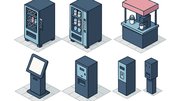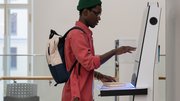Article
Microsoft introduces multi-touch computer interface
Companies are looking at self-service applications to use with Surface.

June 24, 2007
Envision placing a wine glass on top of a table, which also is a touchscreen computer. The table recognizes the barcoded glass and up pops a window on the touchscreen. The table proceeds to tell the user about the wine in the glass — where it comes from, what other wines are similar and suggested food items to accompany the wine. And the experience goes even further, letting users access information about the wine-growing region, helping them plan trips to that location. It's just one of the ways deployers in the self-service world will be able to use Microsoft Surface, a new touchscreen table that opens ways for consumer interaction.
Several businesses already are planning their Surface deployments, slated to launch by the end of the year. Surface control Microsoft Surface is designed to give the user complete control, said Mark Ozawa, managing director at Accuvia Consulting. Ozawa is one of a very few who have been able to demo Microsoft's new device. "This is a fun machine," he said. "It's very easy and intuitive. It doesn't have a keyboard or mouse, and it just relies on touch. It's a machine that lets you manipulate it and it lets you go where your mind takes you." Surface is a 30-inch display table that can be used by more than one person simultaneously, meaning users can touch different parts of the table without disrupting its operation. In addition, users can interact with content — including photos, music and maps — by distributing it around the screen. Microsoft's latest product also has the ability to recognize physical objects that have identification tags, similar to barcodes. "Surface computing," which Microsoft has tagged this latest touch industry, brings natural interaction to the digital world in a new way, Microsoft's chief executive, Steve Ballmer, said in a statement. "With Surface, we are creating more intuitive ways for people to interact with technology," he said. "We envision a time when surface computing will be pervasive, from tabletops and counters to the hallway mirror." Casinos and Microsoft Surface Harrah's Entertainment, a large corporation whose properties include Caesars Palace in Las Vegas, is one of a few businesses Microsoft tapped to pilot its Surface units. Starwood Hotels and Resorts and T-Mobile USA are two other businesses set to deploy test units by the end of the year. One of the ways Harrah's plans to use the Surface is as a virtual concierge, said Tim Stanley, Harrah's chief information officer. The units will be installed in the VIP area, where an employee will guide guests through an interactive map of Harrah's properties. As the user moves his hands across the table, the Surface unit will give information about restaurants, gaming areas, etc. Harrah's also plans to use the Surface for food and beverage services and gaming. Guests could order drinks and appetizers as well as send a drink to another table, Stanley said. After the launch, Harrah's plans to offer play-for-fun games for the Surface, too. As the owner of the World Series of Poker brand, Harrah's might also look for ways to include poker on future Surface machines. Starwood Hotels will launch Surface in the lobbies at its Sheraton Hotels and Resorts. The units will provide guests with greater service and entertainment, said Hoyt Harper, a senior vice president for Sheraton. Guests using Sheraton's version of the Surface will be able to browse and listen to music, create their own playlists, send photos, download books, and order food and drinks. "We are creating new and engaging ways for our guests to connect with their passions while away from home," Harper said. T-Mobile's use of Surface will focus on product information. Placing a cell phone on T-Mobile's Surface units will give customers product features, prices and phone plans that are compatible with the phone. "Customers tell us they want more information about our products and services, but in a way that is easily accessible, at their own pace and with the amount of detail they prefer," said Bonita Inza, vice president of retail for T-Mobile. "Surface is one example of how we're turning our stores into a playground where customers can comfortably explore exciting new products in their own personal way." Consumer and cost friendly? The Surface machines will ship to customers with a portfolio of basic applications, including photos, music and virtual concierge. It will be up to the businesses, however, to develop software applications that are appropriate for their needs, Ozawa said. "If companies come up with the solutions that take these devices from being novelty items to making their lives easier, then they will catch on with the mass public," Haynes said. A cost of approximately $10,000 per unit is another worry. Developing a wide customer base will take a while, says Dave Haynes of Digital Media View. He said most people won't begin thinking about getting the Surface until the price tag comes in at less than $2,000 per unit. Until then, it will be the large casinos and resorts that take advantage of the new technology. Several businesses that have enough cash for the units will begin developing self-service applications for their customers, in hopes that the Surface units do, in fact, engage users in a whole different way. "I do think (Surface) is a potentially evolutionary product," Ozawa said. Richard Slawsky, a reporter for NetWorld Alliance's Food Service Division, contributed to this story.
| ||||||||||||||||||||||











